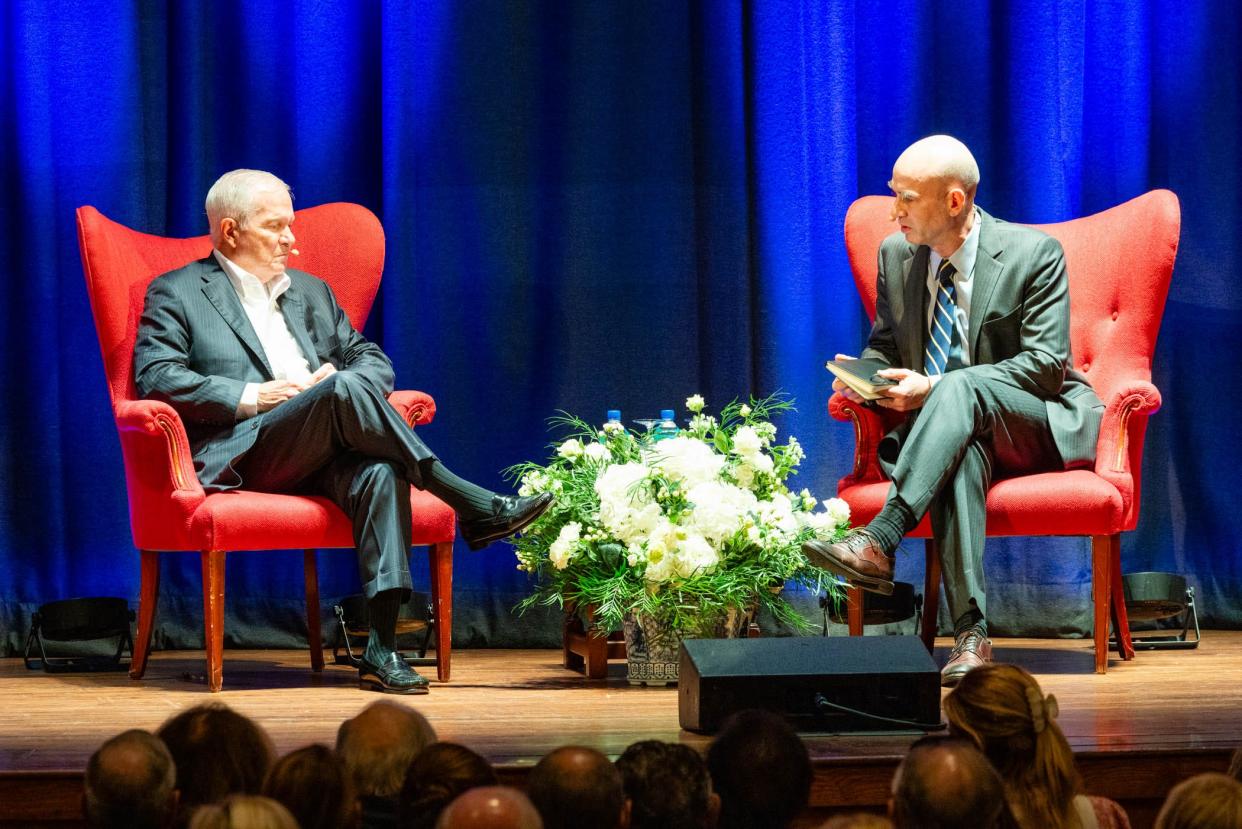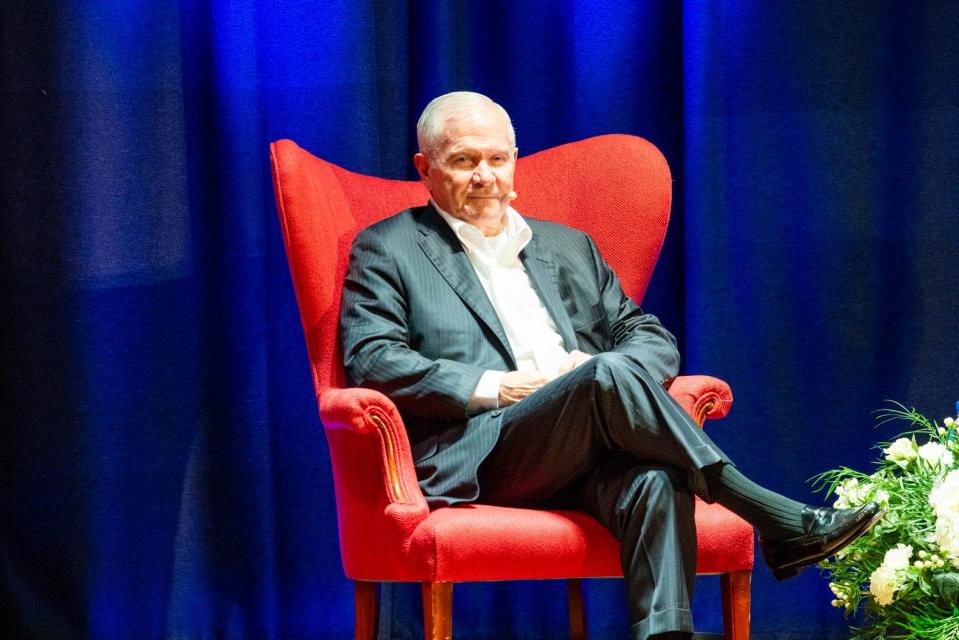Former Defense Secretary Robert Gates: U.S. faces more danger today than since end of WWII

- Oops!Something went wrong.Please try again later.
Between Russia, China and North Korea, the U.S is facing more danger now than it has since the end of World War II, and even more than it did during the Cold War, former U.S. Defense Secretary Robert Gates said during a lecture Tuesday.
“Potentially, for the first time in our history, we will face three adversaries with nuclear weapons that collectively will have twice as many nuclear weapons than the United States,” Gates told a sold-out crowd who gathered to hear his remarks in the Society of the Four Arts' Esther B. O’Keeffe Speakers' Series. “We’ve never faced that situation before.”
Gates served as defense secretary under President Barack Obama and as the director of the Central Intelligence Agency under President George H. W. Bush. He told moderator James Bennet, a senior editor at The Economist, that it is crucial for the U.S. to modernize its military so it can keep up with its rivals and deter potential adversaries.
He said this change wasn’t happening, and he blamed the Congress' continued use of stopgap funding bills, which provide only the money the Pentagon needs to run in place, not to move forward.
“You have all this rhetoric coming out of both the Pentagon and Congress about all these new systems like replicator drones, and new kinds of lasers and hypersonic (missiles) and so on. You can’t buy any of those,” said Gates.
Gates said that beyond hampering the military, partisan gridlocks weaken the U.S's international standing. He criticized U.S. Sen. Tommy Tuberville, R-Alabama, for blocking all military promotions from February to December 2023 over a disagreement about abortion policy.
“How stupid do we look in the eyes of the rest of the world, when we can’t even get the heads of our military services approved by the Senate because of our political paralysis?” he said.
Gates said the U.S. is in a much more challenging time compared to the Cold War due to how complicated the relationship has become between its economy and China's. Unlike the Soviet Union of the Cold War, the China of today has the economic ability to exist and grow in the long term, he said.

Robert Gates: Two-state solution for Israel, Palestine impossible right now
Speaking about the Israel-Gaza War, Gates said he agreed with President Joe Biden's administration’s support for Israel following Hamas’ Oct. 7 cross-border attack that killed around 1,200 and saw 240 being kidnapped, more than half of whom remain hostage.
Israel’s subsequent invasion of the Gaza Strip has killed more than 25,000 Palestinians, most of those women and children, according to the Health Ministry in Gaza.
While Gates said he believes Israel’s military response is justified, he said he supported the Biden Administration’s increasing pressure to allow more humanitarian aid into the Gaza Strip. It’s a rare statement of support for the president's foreign policy. In his 2014 memoir, Gates described Biden as being “wrong on nearly every major foreign policy and national security issue over the past four decades.”
“I regret, for their own sake, that the Israeli government has been so reluctant to allow that to be organized,” he said.
Gates said while there may be legitimate concerns of supplies being smuggled for Hamas inside the humanitarian supplies, Israel is “losing the international messaging” with these actions.
Gates said he disagrees with the push by the Biden Administration and others international leaders for a two-state solution in the near future. He said there is almost no support for a two-state solution in Israel and that "the trauma of Oct. 7 is too real." A Dec. 22 Gallup poll found that 65% of Israelis oppose a two-state solution.
“I mean everybody in the world agrees in a two-state solution, everybody except Israel agree the two-state solution is the solution,” he said. “Fine. How do you actually get from here to there?”
Instead, he said that there must be a change of leadership, particularly in the Palestinian Authority, before any move toward a two-state process. He also said the surrounding Arab states can aid in pushing Palestinians into changing the leadership at the authority. Palestinian activists within the West Bank for years have advocated for a democratic parliamentary election, as the last one took place in 2006, nearly 18 years ago.
Robert Gates: Ukraine should make short-term sacrifices for long-term success
Moving to the Russia-Ukraine war, Gates said the war was following the historical pattern seen in every conflict in which Russia had taken part. He said Russia “has always done badly at the beginning of its wars,” but just like World War II, they transform their nation to cope with the war effort.
“Russians lost, our military estimates, 350,000 troops. … Despite that they now have more troops in Ukraine than they had at any time since their invasion of Eastern Ukraine,” he said.
Gates said without western support, Ukraine could fall within the next year. He also said that if left unchecked, Putin would expand his territorial gains beyond Ukraine, citing Putin’s “Russian World” policy that states Russia would intervene abroad to support ethnic Russians populations.
“There’s a reason the Baltic states are nervous as hell right now,” he said. “They know the Russians really well, from very personal experience.”
Gates said turning away from Ukraine would weaken U.S. deterrence efforts elsewhere, including Taiwan. Yet he also said Ukraine must be realistic and make compromises with Russia to negotiate an end to the conflict. His idea: Negotiate a cease-fire that leaves Ukraine’s major seaport, Odessa, in Ukrainian control.
Regarding the four provinces currently occupied by Russia, Gates said Ukraine’s allies can just refuse to recognize them as Russian territory. “Ukraine needs to be realistic and play the long game here and wait for a different regime," he said.
From there, he said Ukraine can work to develop its economy and military, possibly joining the European Union and NATO, “so that in the future, Russia would know they could not do … what they did in 2022."
Diego Diaz Lasa is a journalist at the Palm Beach Daily News, part of the USA TODAY Florida Network. You can reach him at dlasa@pbdailynews.com. Help support our journalism. Subscribe today.
This article originally appeared on Palm Beach Daily News: U.S. faces more danger today than since WWII, ex-defense chief says

